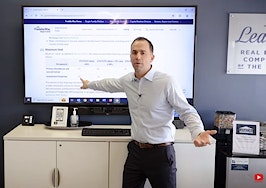No one can predict the future of real estate, but you can prepare. Find out what to prepare for and pick up the tools you’ll need at the immersive Virtual Inman Connect on Nov. 1-2, 2023. And don’t miss Inman Connect New York on Jan. 23-25, 2024, where AI, capital and more will be center stage. Bet big on the roaring future, and join us at Connect.
California lawmakers have signed off on remote online notarization (RON), putting the nation’s most populous state on track to fall into line with 44 others that have already approved a process that can speed real estate closings.
Gov. Gavin Newsom is expected to sign a bill passed unanimously by both chambers of the California Legislature, after proponents worked through issues raised by California’s Secretary of State and Attorney General’s office, said Pat Kinsel, founder and CEO of Notarize.
SB 696 — approved in a 39-0 Senate vote Monday and 78-0 by the Assembly on Sept. 7 — includes stringent identity verification standards and would require out-of-state vendors to follow California’s standards if they want to perform online notarizations.
California may be known as a hotbed of technological innovation, but getting legislation passed in California is often a challenge due to its size and varied constituency, Kinsel said.

Pat Kinsel
In addition, there were “specific issues that needed to be worked through” for the Attorney General and Secretary of State to get behind online notarization,” Kinsel said. “The Attorney General is focused on consumer protection and enforcement, and it takes a while to get engagement.”
California to require identity proofing
According to the bill’s text, notaries who perform RON in California will be required to use an “identity proofing” process or service in which a third party affirms the identity of an individual through a review of personal information from public or proprietary data sources.
Identity proofing “shall be performed at least at Identity Assurance Level 2” as established by the National Institutes of Standards and Technology (NIST). The NIST publication that spells out that standard requires notaries to collect and validate documents validating the signatories’ identity and to confirm their address.
In addition, businesses located outside of California that want to conduct online notarizations involving California residents would have to consent to the jurisdiction of California courts.
The bill would require notaries to create encrypted electronic journal entries “for each remote online notarial act and an audio-video recording of the audio-video communication of each remote online notarial act” they facilitate.
“I do think California is going to raise the bar nationally, not unlike the CCPA,” Kinsel said of the California Consumer Privacy Act, an influential 2018 law governing the collection and sale of personal information.
Timeline for implementation uncertain
Once SB 696 is signed into law, the California Secretary of State will first have to certify that the technology needed to implement statutes related to online notarization is in place before notaries can start assisting in remote closings.
As originally proposed, the bill was to have become effective Jan. 1, 2025, but that language was stripped out of the final legislation. SB 696 sets a tentative deadline of Jan. 1, 2030, for the Secretary of State to complete a technology project needed to support online notarizations.
But the hope is that RON will come to California long before that. James Fulgenzi, Notarize’s director of government affairs, told Inman via email that the law will be implemented in phases.
“Starting on Jan. 1, 2024, California will expand and strengthen its current recognition of notarial acts performed by notaries in other states, meaning a signer in California can have a RON done by a notary in another state and rest easy knowing it will be recognized in California,” Fulgenzi said. “On the other hand, the notaries of California will not be able to perform RON until the Secretary of State completes the technology project necessary to implement the requirements of SB 696. We expect that work to continue over the next several years.”
The California Secretary of State had not responded by publication time to a request from Inman on the potential timeline for RON implementation.
Online notarization can be a boon not only for parties in real estate transactions but for anyone requiring a notary to certify documents needed to access healthcare, travel or start a business — such as powers of attorney, passport applications or articles of incorporation. Kinsel said many people who live in rural areas or states where notaries are few and far between could benefit, citing research by the Urban Institute.
With California moving toward allowing RON, only five states have yet to pass legislation explicitly authorizing remote online notarizations: Connecticut, Georgia, Mississippi, South Carolina and South Dakota.
Three of those states — Connecticut, Georgia and South Carolina — are “attorney closing states,” where a lawyer must attend or supervise the real estate closings.
Kinsel said some groups representing attorneys and title insurers have been “reticent” to digitize closings, but noted that several large attorney closing states (by law or custom) have moved forward with RON, including Massachusetts, New York and New Jersey.
Online notarization gained momentum during the pandemic, when a number of states, including Massachusetts, passed temporary authorizations to allow business to be conducted while protecting public health. In March, Massachusetts passed a law permanently authorizing RON. The new law takes effect on Jan. 1, 2024.
Get Inman’s Mortgage Brief Newsletter delivered right to your inbox. A weekly roundup of all the biggest news in the world of mortgages and closings delivered every Wednesday. Click here to subscribe.













